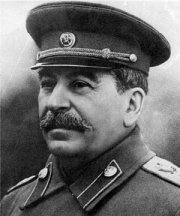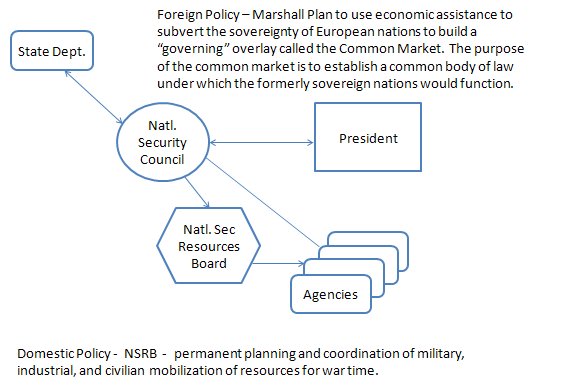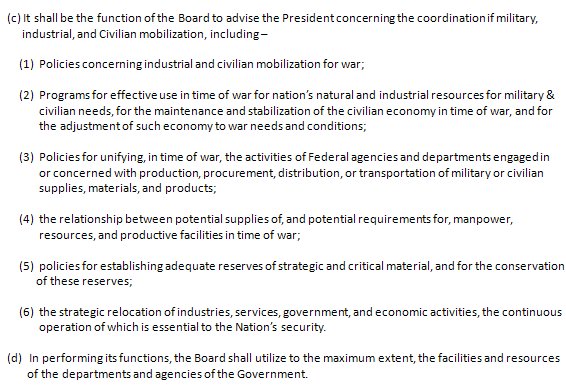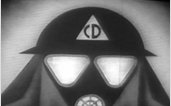Empire of the Black Robes
Before the National Security Act of 1947 to reorganize our government was
passed, we were one nation comprised of 48 states - republics in their own
right. I don't think it's hyperbolic to say that the fall of the
republics began with the creation of a new entity under the rubric of National
Security. The new entity was called the National Security Resources Board.
Consider this scenario:
The war was over
|
Hostilities in Europe
officially ended on May 8, 1945; peace agreements had been signed, the
allied nations had created an international association of nations to
serve as a forum for international discussions, the Marshall Plan had
been proposed and passed in our Congress to help with the rebuilding of
Europe.
The Plan was presented to
the nations of Europe but to get the money, the countries of Europe -
including the Soviet Union, had to agree to work collectively towards a
"Common Market" which entailed the "harmonization of laws, elimination
of economic sovereignty, open borders between countries and central
planning for a "whole of Europe" infrastructure.
Although it's never discussed in this way, a common
market overlay eliminates national sovereignty. |
|

Stalin declined to
participate in the Marshall Plan. Stalin is alleged to
have said in 1945:
"This is not a war
as in the past: Whoever occupies a territory will also determine its
societal system. Everyone introduces his own system as far as his own
army can advance. It can't be any other way."
Robert A. Selig quoting Yugoslav Milovan Sjilas. |
The purpose of the National Security Council was to direct
foreign policy using "economic development" money break down the laws and
customs of European countries in order to build common system of law to govern
all of Europe.

The following is an excerpt from the
National Security Act
of 1947 (Page 6) concerning the creation and purpose of the National
Security Resources Board:
Sec. 103

With the war just
over and in the legislation for de-mobilization of the war machine, do we really
believe that the purpose of the National Security Resources Board (NSRB) was for
war time mobilization?
The
Invisible Enemy
 |
|
The "war time
mobilization" efforts were carried out under the label of
civil defense. As an
elementary school student in the 1950's, I remember vividly the 'Duck
and Cover' exercises which scientists knew were a fraud. If you
were in the zone of impact, nothing could save you - and if you weren't,
then getting under your desk on command would serve no purpose.
|
More likely, the
whole civil defense
shtick was simply a ruse for another purpose and that other purpose was
essentially the same as the Marshall Plan for Europe. Foreign and domestic
policy were being coordinated out of the same cell - the National Security
Council. It's not a stretch to think that the objective of the NSRB was to
harmonize laws across the state lines - using fear initially and federal money
later to turn our state officials into sock puppets who have been subverting
state authority every since. With consideration for the North
American Free Trade Agreement (NAFTA) to formalize the subversion of national
sovereignty to a "common market" structure over North America, I think the
verdict is in.
The term "common
market" equates to a common body of law governing the entire region -
regardless of national boundaries. The
Uniform Commercial Code
was first published in 1952 which means they started writing it
... oh gee... how about between 1947 and 1951.
International Law
Regional "common
market" associations include multiple countries. That means when a country
joins a common market or creates a common market - as in the case of the United
States, Mexico and Canada, they are subverting their own national sovereignty
and are placing themselves in the jurisdiction of the international system of
law.

The Peace Palace at The Hague
"The
Hague Conference on Private International Law (HccH) is the oldest
international organisation based in The Hague. Since 1893 its mission has
been to work towards a world in which individuals and companies can enjoy a
high degree of legal security when crossing borders between countries.
Founded in
1893, The Hague Conference was the first ever international body to be
established in The Hague. It is also the only legislative body among the
many legal institutions in The Hague. It is the world’s leading
intergovernmental organisation in the field of private international law.
It has drawn up no less than 38
international treaties or conventions to help overcome legal obstacles faced
by individuals and companies in cross-border relations and transactions."
The
Hague
Conference on Private law describes its mission this way:
…BUILDING BRIDGES BETWEEN LEGAL SYSTEMS…
Personal and family or commercial situations which are connected with more
than one country are commonplace in the modern world. These may be affected
by differences between the legal systems in those countries. With a view to
resolving these differences, States have adopted special rules known as
"private international law" rules.
The statutory mission of the Conference is to work for the "progressive
unification" of these rules. This involves finding
internationally-agreed approaches to issues such as jurisdiction of the
courts, applicable law, and the recognition and enforcement of judgments in
a wide range of areas, from commercial law and banking law to international
civil procedure and from child protection to matters of marriage and
personal status.
Over the years, the Conference has, in carrying out its mission,
increasingly become a centre for international judicial and administrative
co-operation in the area of private law, especially in the fields of
protection of the family and children, of civil procedure and commercial
law.
|
The Hague Conference on Private
International Law (HCCH)
is a global intergovernmental organisation working for the progressive
unification of these rules. This
involves finding internationally-agreed approaches to issues such as
jurisdiction of the courts, applicable law, and the recognition and
enforcement of judgements in a wide range of areas, from commercial law
and banking law to international civil procedure and from child
protection to matters of marriage and personal status. The
ultimate goal of the organisation is to work for a world in which,
despite the differences between legal systems, persons – individuals as
well as companies – can enjoy a high degree of legal security. |

Notice the logo is a cage |
U.S. Root in
International Law
In 1903,
Andrew Carnegie donated $1.5 million dollars to build The Hague Palace
of Peace.
In 1910, Carnegie
funded the Carnegie Endowment for International Peace with Elihu Root as
President. The Endowment was chartered in 1911 with Elihu Root as the
first President. Root was a New York corporate lawyer whose mission was to
build the institutions for international law.
Time Magazine,
April 21, 1923 - concerning the
Permanent
Court of International Justice
"In February,
1920, the Council [of the League of Nations] appointed an Advisory Committee
of Jurists, among them Elihu Root, who drew up a plan for the Court. In
December of that year the Assembly of the League adopted the Committee's
plan with alterations. This "statute" of the Court was subsequently ratified
by a majority of the members of the League, and judges were elected."
Elihu Root died
in 1937. His
obituary
only hints at the power and influence this lawyer wielded.
My purpose was not to delve into international law so much as to have you look
at the administrative structure of international law that has been built to
subvert national sovereignty and to move access to the law farther and farther
away from the people. Looking at the structures and the
history, it is
the conclusion of this writer, that what has been built is an Empire of the
Black Robes.

Here are links to two videos about Vladmir Putin and how he
came to power in Russia.
The
Unknown Putin - Part 1
The Unknown Putin - Part 2
Note:
"When the young reformers arrived" Destroyed the tool
and die industry... the manufacturing capacity. (The
young reformers - "new ways of doing business = systems")
"exports only"
design of the
global economic system - export production - import consumption... but there is
no money for the imports because the wealth from the exports is concentrated
into just a few hands.
"our laws were being written
in America" "nobody bothered to read them"
damn...
Jeffrey Sachs was at least one of the "young reformers" at the time.
Empire of the
Black Robe - Part 2
Vicky Davis
September 7, 2013 - updated September 8, 2013
Empire of the
Black Robe - Part 2






